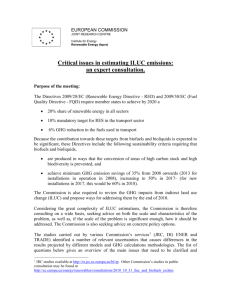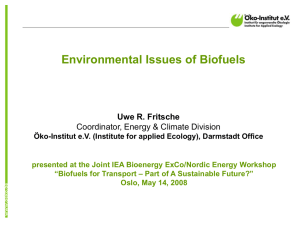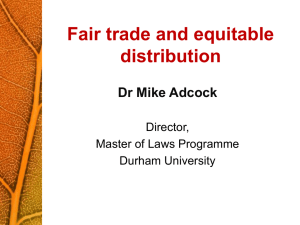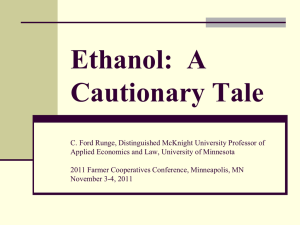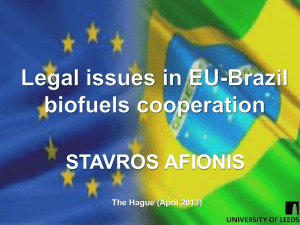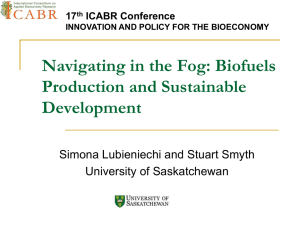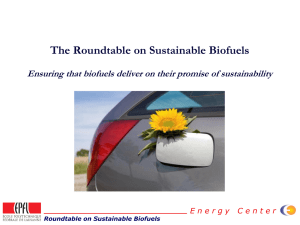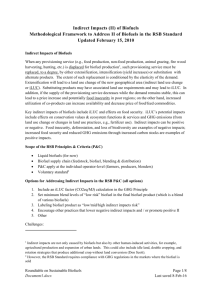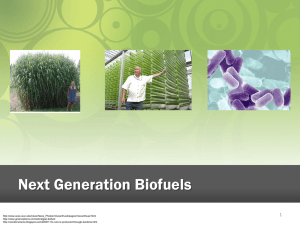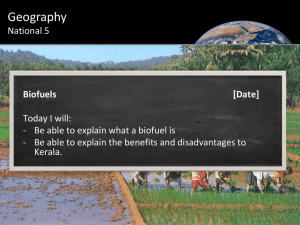Consultation on Indirect Land-Use Change
advertisement
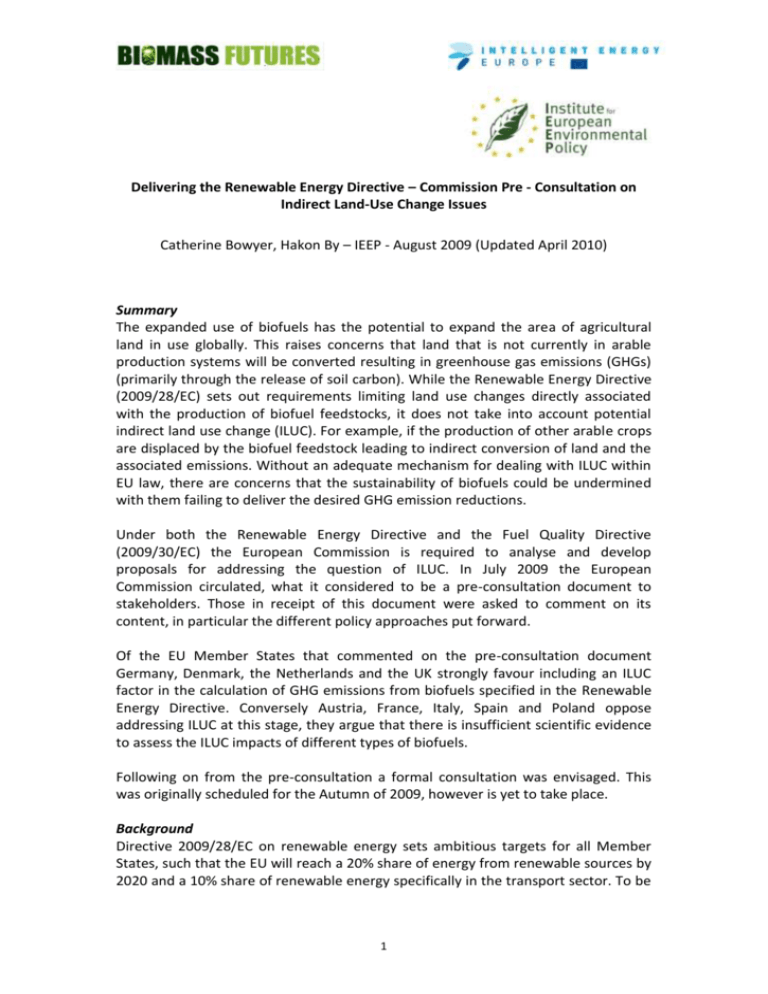
Delivering the Renewable Energy Directive – Commission Pre - Consultation on Indirect Land-Use Change Issues Catherine Bowyer, Hakon By – IEEP - August 2009 (Updated April 2010) Summary The expanded use of biofuels has the potential to expand the area of agricultural land in use globally. This raises concerns that land that is not currently in arable production systems will be converted resulting in greenhouse gas emissions (GHGs) (primarily through the release of soil carbon). While the Renewable Energy Directive (2009/28/EC) sets out requirements limiting land use changes directly associated with the production of biofuel feedstocks, it does not take into account potential indirect land use change (ILUC). For example, if the production of other arable crops are displaced by the biofuel feedstock leading to indirect conversion of land and the associated emissions. Without an adequate mechanism for dealing with ILUC within EU law, there are concerns that the sustainability of biofuels could be undermined with them failing to deliver the desired GHG emission reductions. Under both the Renewable Energy Directive and the Fuel Quality Directive (2009/30/EC) the European Commission is required to analyse and develop proposals for addressing the question of ILUC. In July 2009 the European Commission circulated, what it considered to be a pre-consultation document to stakeholders. Those in receipt of this document were asked to comment on its content, in particular the different policy approaches put forward. Of the EU Member States that commented on the pre-consultation document Germany, Denmark, the Netherlands and the UK strongly favour including an ILUC factor in the calculation of GHG emissions from biofuels specified in the Renewable Energy Directive. Conversely Austria, France, Italy, Spain and Poland oppose addressing ILUC at this stage, they argue that there is insufficient scientific evidence to assess the ILUC impacts of different types of biofuels. Following on from the pre-consultation a formal consultation was envisaged. This was originally scheduled for the Autumn of 2009, however is yet to take place. Background Directive 2009/28/EC on renewable energy sets ambitious targets for all Member States, such that the EU will reach a 20% share of energy from renewable sources by 2020 and a 10% share of renewable energy specifically in the transport sector. To be 1 counted towards the renewable energy in transport target, biofuels are subject to a greenhouse gas (GHG) reduction target, as well as to other sustainability criteria. The Directive includes a list of default values for the GHG savings of different biofuels. However, it includes no provision for calculating the GHG emission impacts of indirect land use change (ILUC) resulting from existing crop displacement. Several environmental organisations, national technical agencies and scientific institutions consider this a dangerous flaw in the Directive, capable of negating any GHG savings from using biofuels as an alternative transport fuel. As a first step towards establishing a mechanisms to address, or at least minimise the impact of ILUC, the Commission drafted a preparatory list of possible policy elements1, and invited experts and stakeholders to submit comments by 31 July 2009. Policy elements considered at this preparatory stage included: Extend to other commodities and countries the restrictions on land use change that will be imposed on biofuels consumed in the EU; Reach international agreements on protecting carbon-rich habitats; Do nothing; Increase the minimum required level of GHG savings; Extend the use of bonuses (e.g. to biofuels that do not come from land and to biofuels from idle land); Set additional sustainability requirements for biofuels from crops/areas whose production is liable to lead to a high level of damaging land use change; Include an indirect land use change factor in GHG emission calculations for biofuels; and Other policy elements that respondents wished to raise. In August 2009 the European Commission published the results of its preconsultation exercise2. The key points are summarised below. Policies and measures Most Member States support the option to extend possible ILUC restrictions on biofuels to non-EU countries and other agricultural commodities. This would, however, have serious international trade implications. As a result, reaching international agreements on protecting carbon-rich habitats is seen as the preferable solution in the long-term. 1 Indirect land use change, biofuels and bioliquids – pre-consultation. Contributions http://ec.europa.eu/energy/renewables/consultations/doc/iluc_consultation_comments_by_country.zip by country. 2 Indirect land use change, biofuels and bioliquids – pre-consultation. Contributions http://ec.europa.eu/energy/renewables/consultations/doc/iluc_consultation_comments_by_country.zip by country. 2 In this regard, Austria argues in its submission that within the EU there are already sufficient nature protection measures in place, so, presumably, any new measures would be applicable only to imported biofuels. Member States also generally favour extending the use of bonuses to encourage certain types of biofuel production, but do not see this as a sufficiently effective way to address the particular problems related to ILUC. Member States are, however, deeply divided over the issue of including an ILUC factor in the calculation of GHG emissions. Indeed, the battle lines have remained mostly unchanged since the negotiation of the renewable energy Directive took place in 2008. Germany, Denmark, the Netherlands and the UK strongly favour including an ILUC factor in an amended policy. They argue that a level of uncertainty on ILUC effects cannot be used to justify inaction, and that ILUC due to additional biofuels production has the potential to outweigh any GHG benefit. This view received strong support from the European Parliament during the negotiation of the Directive. On the other hand (echoing the Commission’s initial concerns) Austria, France, Italy, Spain and Poland oppose including an ILUC factor; arguing there is insufficient scientific evidence to assess the ILUC impacts of different types of biofuels. Until further research is completed on the issue, they believe the level of GHG savings required by Directive 2009/28/EC provides a sufficiently large ‘cushion’ to prevent adverse GHG emission impacts of ILUC. Their concern is that introducing an ILUC factor at this stage would discourage the production of biofuels and bioliquids (ie vegetable oil used in electricity generation) regardless of their sustainability. This view is supported by Indonesia and Argentina, two potentially major exporters of biofuels, as well as Brazil – currently the only producer able to supply the EU should an ILUC factor be included, since only Brazilian sugar-cane ethanol and biodiesel from waste vegetable or animal oil would count towards the EU target. Future developments The comments gathered in the pre-consultation process will feed into the Commission’s drafting of a formal consultation. This was anticipated for the Autumn of 2009, but (as of April 2010) has yet to take place. A report reviewing the impact of ILUC on GHG emissions and addressing ways to minimise that impact, and, if appropriate, an accompanying legislative proposal, will be completed by the Commission and submitted to the European Parliament and to the Council. Under the Renewable Energy Directive this report was required by March 2010, but again (as of April 2010) has yet to emerge. It was originally the intention that details on how to address ILUC would be available in time to allow Member States to take account of this within their National Renewable Energy Action Plans (NREAP) (due June 2010) and to ensure ILUC could be taken into account ahead of the formal date for compliance with the Renewable Energy Directives requirements (in December 2010). Both now appear unlikely potentially hampering the NREAP process and undermining the credibility of the EU scheme. 3
